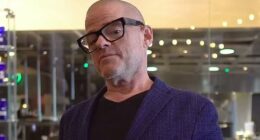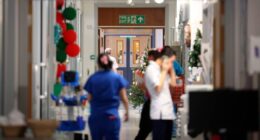When I was 18 I watched a friend’s dad operate while I was on work experience at a hospital. The minute I walked into that theatre and saw this bowel being lifted up, I thought, “This is amazing. I have to do this.”
As a breast surgeon, I loved the artistry behind the surgery, and the way you develop such a close relationship with your patients. But I never checked my breasts regularly. I thought, “I’m a breast surgeon – I’m not going to get breast cancer.” Completely ridiculous.
When I had an ultrasound for a lump, I looked at the screen and knew instantly it was a cancer and I needed chemo and a mastectomy. And I had a good idea of my prognosis: I thought I had a 60-70% chance of being alive in 10 years.
I was treated at the hospital where I trained; my former colleagues did my operation. Everyone was trying to be very professional, but going into theatre, I could feel the emotion in the room. I wanted to tell my surgeon, “Can you use these sutures? And can you put the drain here? And can you put this dressing on?” She asked me to stop and said: “Be the patient.” I trusted her completely, but giving up control was really hard for me.
I didn’t get the impact of having breast cancer before it happened to me. I only knew the basics about the side-effects of chemotherapy, because those were the oncologist’s job. Then suddenly, oh my god: the brain fog, constipation, how the menopausal symptoms can affect your relationship. And the grief for things you’ve lost. My husband and I didn’t have children, and we knew chemo would more than likely make me infertile.
I had 18 months off to recover and plan a route back to work. It was really, really hard. The first time I saw someone find out she had cancer, she was young, and I saw her and her husband crumple, and I just thought: “I can’t make this better.” I had flashbacks, thinking this was what my husband and I looked like.
The first operation I did brought a sense of relief and pride, but also sorrow for what that woman was going to go through. You’re so desperate to share your own experiences, but it’s not right ethically.
I changed my language. I used to say things like, “We’re lucky we caught it early, and it’s good it hasn’t spread.” But no one’s lucky to get cancer, and no cancer’s good to have. I used to say, “Don’t Google it.” First thing I did? Google, middle of the night, metastatic cancer blogs. We need to recognise that people will go online and signpost them to the best resources.
READ RELATED: Want to breathe easy this winter? Turn your home into a jungle
I’m embarrassed that I never looked at a breast cancer forum before I was diagnosed. It would help if doctors took the time to do that, to get an idea of what patients want when they leave your office. And I never listened to patients at conferences because I was too busy networking and hearing about the latest treatments. Everybody should listen to the patient experience.
Five months after I returned to work, my cancer came back. That meant having my implant removed, more radiotherapy, having my ovaries out. And it meant I was forced to retire because I could no longer move my left arm, so I couldn’t operate safely. Twenty years of my life had gone and I was in despair. Now, through talking and blogging and doing videos, I have my own way of helping people. But it is hard having to rediscover yourself when it wasn’t your choice.
after newsletter promotion
I can’t remember the last operation I did. I got the results of my biopsy the next day and I never went back. I wonder whether, if I had known it was my last operation, I would have done things differently. Would I have been better or worse because the pressure was on? I really, really miss being in that room of people coming together to make a difference to someone’s life.
Dr Liz O’Riordan is a breast surgeon, author, podcaster and on Instagram @oriordanliz. Her memoir, Under the Knife: Life Lessons from the Operating Theatre, is published by Unbound.
Comments on this piece are premoderated to ensure discussion remains on topics raised by the writer. Please be aware there may be a short delay in comments appearing on the site.




